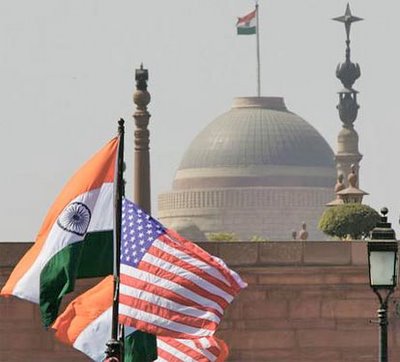R.I.P: The British Raj
 Oh, East is East and West is West, and never the twain shall meet,
Oh, East is East and West is West, and never the twain shall meet,Till Earth and Sky stand presently at God's great Judgement Seat;
But there is neither East nor West, Border, nor Breed, nor Birth,
When two strong men stand face to face, though they come from the ends of the earth!
- The Ballad of East and West, Rudyard Kipling.
This year is the 150th anniversary of the Sepoy Mutiny or the Rebellion of 1857 against the British, whose subsequent defeat by the British led to them assuming direct possession over her jewel in the crown from the East India Company.
While i certainly don't care much for the British, i care even less for those *cough* pseudo seculars *cough* who are planning on portraying the rebellion with great hype and politically motivated propaganda in the coming weeks as a historic nationalist uprising against British imperialism that supposedly united Hindus and Muslims under a common cause. In fact had i been alive at the time, i would have gladly sided with the British and helped crush the uprising if only for no other reason than the mutineers plan to restore the rule of the enfeebled Mughal Emperor Bahadur Shah Zafar whose authority at that time barely extended beyond the walls of the red fort.
While its true that the reasons (some im sympathetic too, some very suspect) that motivated those who fought in the uprisings are many, i'll be damned if the end result is the mere replacement one set of foreign rulers by bringing back the previously infinitely worse bunch. While some Mughal Emperors like Akbar and in particular Shah Jehan's son and chosen heir Prince Dara Shikoh were indeed enlightened and could have perhaps dramatically altered India's history had he won the crucial battle of succession, nonetheless with the triumph of fanatic tyrannical rulers like Aurangzeb in wrestling control of the throne every so often in an otherwise generally oppressive rule, clearly the Mughal empire or what was left of it had to be put to the sword.
Todays its difficult to imagine what India would be like if the uprising had succeeded (probably fragmented into hundreds of feuding princely states interspersed with a handful of large regional empires). In the end the uprising though coming fairly close to forcing the British from India eventually failed and the British retook Delhi with vengeance by exiling the Mughal and executing his sons, thus striking the final blow to muslim rule in India.
 Though British rule was far from pleasant, one should see the British period as a means to an end. For almost a thousand years Indic civilisation had been in a state of more or less utter decay and demoralisation under the brutal thumb of numerous Islamic invasions and rule.
Though British rule was far from pleasant, one should see the British period as a means to an end. For almost a thousand years Indic civilisation had been in a state of more or less utter decay and demoralisation under the brutal thumb of numerous Islamic invasions and rule.The Poet Iqbal once mockingly but nonetheless very precisely said about the struggle for political supremacy between the Congress party and the Muslim League ahead of India's anticipated independence from the British that "we (muslims) have only been slaves for 200 years, while you Hindu's have been slaves for a thousand years.
To paraphrase V.S Naipaul, "India from the very moment it became British colony, in many ways began to be regenerated, the muslims wounded by their loss of power, prestige and entitlement remained backward and self segrated much as they are today, while Hindus eagerly embraced the new opportunities and freedoms while increasing their relative wealth, education and power exponentially".
"They were also able to receive the new learning of Europe and its enlightenment, to get the institutions that went with that learning, heralding the arrival of great social reformers and later Indian independence leaders who enshrined those virtues in our constitution as a modern democracy", while many other similar nations entered the 20th century in a state of upheaval and with more revolutions than a carousel.
While one may rightly criticize British imperialism that more or less robbed India of much of its wealth and helped to a substantial extent fuel Britain's Industrial Revolution, in the process every so often leading to the mass starvation of tens of millions of Indians, through the imposition of their grossly distorted agricultural and trade policies, one can say that to a certain extent much of this shift in global power and wealth would have happened in any case with or without colonialism as Europe by the 15th century had already started its rapid ascension in comparison to other regions of the world.
Besides economic devastation can be overcome in a matter of decades as shown by post war Japan, a populated nation with almost no resources bar her own people, as well as by the progress China and India itself are making today. So if one is going to blame the British, much more so of the blame must also be laid at the feet of that moron Nehru and his version of Fabian Socialism that dreadfully wasted a further 50 years.
In perspective, the British Raj, while also generally oppressive was also fairly benign in many respects especially in comparison to other European colonial powers like Portugal or the Spanish. The East India Company activities certainly started out innocuously enough as a purely commercial relationship but gradually changed with territorial expansion.
In the inital phase when British military superiority was far from assured, it is often noted that the adventurous men of the East India Company learned local languages, and being far away from the conservative environment of England for long periods of time kept numerous local mistresses as an accepted and common practice in addition to the brothels stretching from Darjeeling to Dalhousie. It is said that some 90% of British officers stationed in India by the mid-eighteenth century had marriages from such liaisons, the offspring of which played a vital role in building up the strength of the East India Company Army, and its further subsequent territorial expansion.
But with technological developments such as the railways and steam ships as well as the opening of the Suez Canal, Christian Evangelicals and the Memsahibs (English women) increasingly began to come to India in relatively large numbers. The role of both the these groups was to maintain civilised standards, which in practice led to an unparalleled social divide between the British Raj and its Indian subjects.
By the 19th century an increasingly arrogant and imperialistic British in possession of India, a huge expanse of territory, with a relatively small army, saw the inevitable happen with the rebellion of 1857. Although the British were very slow to react, they gradually gained the upper hand with the help of allied Indian forces and reinforcements from abroad, though by that time they had been given a rightly deserved bloody nose.
While it would take a further 90 years before India achieved its independence through Mahatma Gandhi's non violent civil disobedience campaign, this one can say was infinitely preferable to the ill conceived armed uprisings of 1857 that India clearly wasn't ready for and if it had succeeded would have brought about more chaos than any good.











